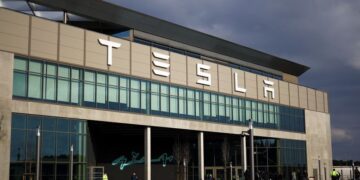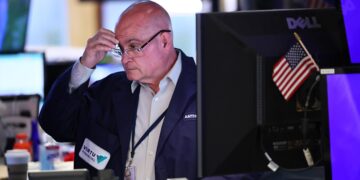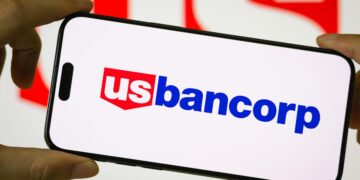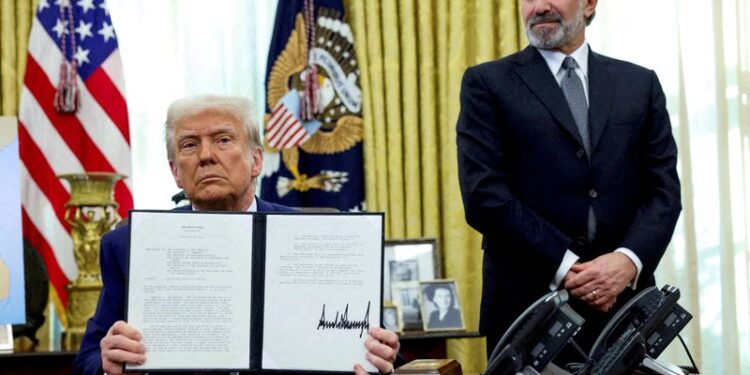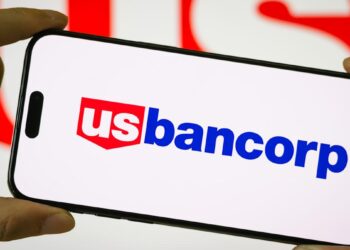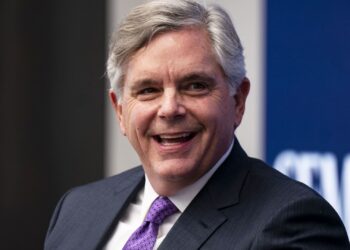As the curtain rises on a new quarter, U.S. stock indexes are poised for a less-than-stellar debut, with futures pointing to a lower open on Tuesday. Investors are bracing for a fresh wave of tariffs from the Trump administration, which promises to shake things up. The formal announcement is expected at 3 p.m. ET tomorrow, according to U.S. Treasury Secretary Scott Bessent. In this climate of uncertainty, investors are flocking to U.S. government bonds and gold, while steering clear of domestic equities, particularly tech stocks.
The fear is that tariffs could hamper economic growth and spark inflation. Trump has already imposed tariffs on imported aluminum and steel and increased duties on Chinese goods. Higher tariffs on cars are set to roll out on Thursday.
Today’s manufacturing activity surveys and the JOLTS job openings report, due at 10 ET, could offer clues about the tariffs’ impact on the U.S. economy and the Federal Reserve’s monetary policy plans.
Yesterday, the Dow Jones closed up by 1%, and the S&P 500 managed a 0.55% gain. Meanwhile, the Nasdaq 100 ended just shy of positive territory, dipping by 0.02%. However, Wall Street wrapped up the first quarter of 2025 with one of its most dismal performances in a decade. The S&P 500 dropped by 4.6%, and the Nasdaq took a hefty 10.5% hit. The Dow Jones, with its traditional composition, fared slightly better, limiting its losses to 1.3%. Across the pond, despite a rocky end to the month with four consecutive declines, the STOXX Europe 600 outshone its American counterparts. It posted a 5.2% gain for the quarter, outperforming the S&P 500 by a notable 9.8%.
For the US market as a whole, the first quarter of 2025 saw a series of records. It is the biggest quarterly decline in the last three years. It is also the biggest gap compared to global equities in more than 15 years and the biggest fall in the dollar at the start of the year since 2017. Another fairly rare event: bonds rose while equities fell, a first in five years.
The worst performing sectors in the United States? Cyclical Consumer (-11.1%) and Technology (-8.5%). The best? Energy (+9%), Consumer Staples (+8.2%) and Healthcare (+7.5%). A classic performance, with defensive stocks taking centre stage. The podium is made up of CVS Health (+51%, health insurance), Philip Morris (+32%, cigarettes) and Newmont (+30%, gold mining). The worst performers? Deckers (-45%, consumer discretionary), Tesla (-36%, Musk Inc) and ON Semiconductor (-35%, AI hype).
In Europe, it was the Banks (+17.2%), Industry (+11.1%) and Energy (+11%) that ensured the outperformance of the indices, while Cyclical Consumption (-4.1%) and Real Estate (-2.5%) fell. The champions of the quarter are, unsurprisingly, defense companies: Rheinmetall (+115%), Thales (+77%) and Leonardo (+73%). Special mention to Société Générale, which seems to have shaken off its torpor (+52%). At the bottom of the list, Puma (-50%, the European Deckers), Soitec (-44%, gloomy outlook) and Greggs (-38%) bring up the rear.
The strategists are completely lost. Some claim that April 2, when U.S. tariffs will be unveiled, will be the peak of volatility, others that we will have to wait for the next employment and inflation statistics. Some think that the customs duties are here to stay, while their opponents believe that they will evaporate after a phase of negotiations. The unmistakable sign is that the most optimistic Wall Street forecasters are all raising their probabilities of economic glitches in the coming weeks. The range goes from the economy’s hard landing to stagflation, via a recession with variable geometry. Only the ultras retain an optimistic approach to what follows.
In other news, the resignation of the FDA’s chief vaccine official has knocked out specialized pharmaceutical companies such as Moderna, as well as biotech start-ups such as Taysha Gene Therapies. In France, Marine Le Pen’s long-term ineligibility for office has weakened the already precarious political environment. On the macro side, there was an upturn in manufacturing activity in China and the Australian central bank decided to keep its rates steady, as expected (maintained at 4.1%).
In the Asia Pacific region, the revival of US indices has given stock markets a much-needed breather. Japan’s market edges up by 0.3%, Hong Kong follows with a 0.5% increase, and Australia sees a 1% rise. Meanwhile, South Korea and Taiwan are putting on a more impressive show, with their indices climbing nearly 3%. However, this rebound is as delicate as a soufflé. India, ever the contrarian, bucks the trend with a decline of over 1%. As for Europe, the mood is cautiously optimistic, with the Stoxx Europe 600 up 1.0%.
Today’s economic highlights:
- Dollar index: 104,311
- Gold: $3,133
- Crude Oil (BRENT): $74.85 (WTI) $71.28
- US 10-year: 4.17%
- BITCOIN: US$83,650
In corporate news:
- Tesla experienced a significant decline in Q1 2025 car sales due to US tariffs and European market disruptions.
- OpenAI raised $40 billion in a SoftBank-led funding round to advance AI research and development.
- Boeing reduced its 737 MAX production rate from 38 to 31 units per month due to wing production delays.
- Chevron sold a majority stake in its East Texas gas assets for $525 million.
- Hyundai Motor America reported a 13% increase in March sales to 87,019 units, while warning of potential price hikes due to proposed US tariffs.
- Warner Bros Discovery Inc. is expanding its board from 13 to 14 members by appointing General Atlantic’s Anton Levy.
- KKR is exploring a merger between FiberCop and Open Fiber and invested over $500 million in ReliaQuest.
- Johnson & Johnson had its third $10 billion bankruptcy deal attempt rejected, redirecting $7 billion to litigate talc claims.
- Rocket Companies acquired Mr. Cooper Group for $9.4 billion.
Analyst Recommendations:
- Autozone, Inc.: Goldman Sachs upgrades to neutral from sell with a price target raised from USD 3044 to USD 3811.
- Block, Inc.: CLSA upgrades to buy from accumulate with a target price of USD 112.
- Genuine Parts Company: Goldman Sachs downgrades to sell from neutral with a target price reduced from USD 133 to USD 114.
- Keurig Dr Pepper Inc.: Morgan Stanley upgrades to overweight from equal weight with a price target raised from USD 38 to USD 40.
- Ulta Beauty, Inc.: Goldman Sachs upgrades to buy from neutral with a price target raised from USD 384 to USD 423.
- Acadia Healthcare Company, Inc.: Mizuho Securities maintains a neutral recommendation with a price target reduced from USD 48 to USD 37.
- Lululemon Athletica Inc.: Daiwa Securities maintains a neutral recommendation with a price target reduced from USD 389 to USD 302.
- Mongodb, Inc.: Citigroup maintains its buy recommendation with a price target reduced from USD 430 to USD 330.
- Pvh Corp.: Evercore ISI maintains its outperform recommendation and reduces the target price from USD 139 to USD 105.
- Vaxcyte, Inc.: Goldman Sachs maintains its buy recommendation and reduces the target price from USD 138 to USD 100.

